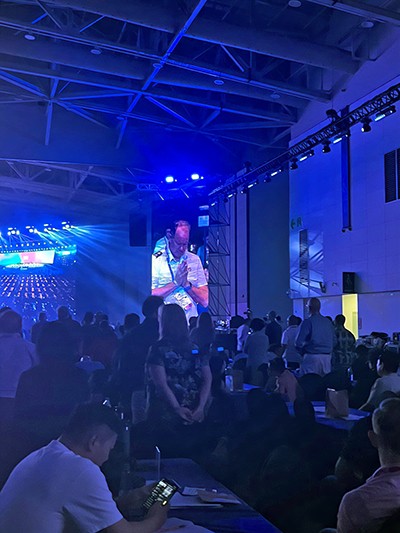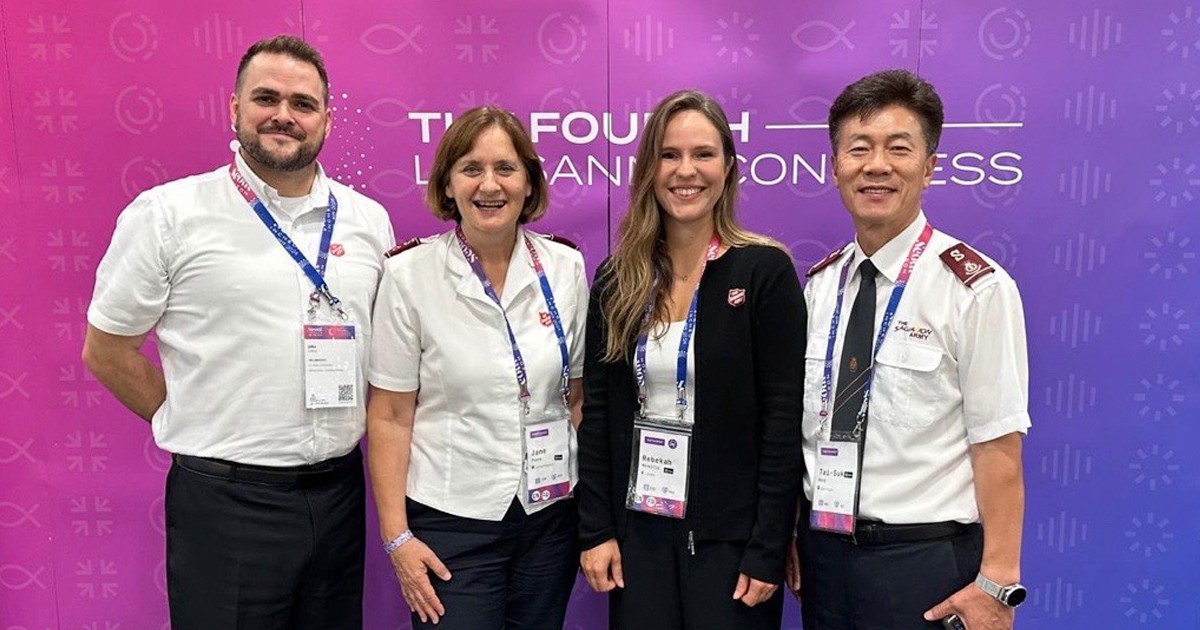In one of the only tech mishaps of the Fourth Lausanne Conference, held in Seoul, South Korea, from September 22-28, 2024, the sound system cut out, and we couldn’t hear the worship leader. For a brief moment, 5,000 delegates stood quietly, suspended in time. Then, starting at the back of the convention centre and building slowly, we sang the chorus of It Is Well With My Soul, with no accompaniment. The global church, gathered from every corner of the earth, raising their voices and praising God together. It was beautiful, moving and uncomplicated. It was hopeful.
The Lausanne Movement began in 1974, when Rev. Billy Graham convened a gathering of Christian leaders from around the world in Lausanne, Switzerland, to collaborate on global mission. Since then, the movement has challenged and mobilized Christians to work together to make Jesus Christ known throughout the world.
I was invited to attend Lausanne after an initial nomination and application was accepted in early 2023. I was one of four international Salvation Army delegates, along with Commissioner Jane Paone, secretary for international ecumenical relations at International Headquarters, Captain John Clifton, United Kingdom and Ireland Territory, and Major Tai Tsuk, Korea Territory. I went into this week-long gathering with few expectations, despite more than a year of anticipation. As I sat down to write about my experience, I felt overwhelmed by the task. How do I adequately capture seven almost-12-hour days of speakers, collaboration sessions and worship?
The congress centred around the theme, “Let the Church Declare and Display Christ Together.” While there was a range of key themes, we broadly focused on how we, as the global church, can be unified in our efforts to evangelize the world. In truth, this emphasis evoked mixed and conflicting emotions in me throughout the week.
Highlights
Every morning, we gathered at the Songdo Convensia for worship and the morning plenary session, with speakers sharing lessons from Acts and reflecting on missiological engagement. In the afternoon, “Collaborate” sessions focused on 25 gaps in the Great Commission, including persecution and least-reached peoples, the next generation, polarization and politics in the church, discipleship in a digital age, sexuality and gender, and more. After dinner, we gathered for a second plenary session of celebration and reflection on the global church, with music and worship by Keith and Kristyn Getty and the Korean group Isaiah6tyOne.
During the sessions, I filled a notebook with near-illegible notes and memorable lines—on God’s design for his church, what unity should look like, what collective repentance means—that took my breath away. There are also notable gaps in my notes when the sessions were so compelling that I did not pause to write anything.
Every time we worshipped, the room filled with beautiful voices (and some tone-deaf ones, too). People raised their hands high, and the screen at the front displayed earnest faces, praying, crying and inviting God to the space.
Among the highlights of the week were the moments of conversation spent in our table groups after each plenary session, talking with new friends from Pakistan, Latvia, Poland, Serbia and the Philippines. I was overwhelmed by the sobering reminder that my western Christian experience is far more comfortable than what Christians in many other parts of the world face.
At some point, I jotted this down: “We cannot replace fervent prayer with strategies.” Much of the conference was about evangelism. Let’s be honest—evangelism is a word that makes some of us cringe when we consider the aggressive and socially unaware methods employed in the past. But the speakers at Lausanne did not resort to this. They reminded us that evangelism is relational, and we are to have a “personalized, contextualized and compassionate gospel witness.” They reiterated time and again that prayer is our most powerful tool.
Faith and Doubt
Alongside the many highlights, I spent much of the week wracked with internal tension, a dose of skepticism and judgment, and frustration that I was not engaging more fully. I was also filled with doubt. Dr. Michael Oh, global executive director of the Lausanne Movement, iron-man aficionado, concise orator and the opening and closing speaker for the week, called us to action. He said, “Why are we here? This is a moment of sober repentance and renewed resolve. We still have a flawed witness and mission. There are more people every year than before that have not heard the gospel. We must repent.
After this line in my notebook, there is my own reflection: “Do I even want to share the gospel? Why would I share the gospel?” This, my friends, is not an admission I make easily. Near the end of the first day, I wrote this: “God? My faith is very little today. Why can’t I hang on?” After more sessions and conversations, I realized it mainly came from an angst around the effectiveness of prayer.
This was most clear on the second-last evening of the week, when a dozen Korean delegates shared the painful yet deeply resilient history of the Korean church in a dramatic presentation. Despite years of national subjugation and imperial oppression, the Korean church expanded.

Countless Koreans and missionaries lost their lives for declaring their faith in Jesus and refusing to surrender. Pastor Son Yangwon’s two sons were murdered by a youth rioter during this period. Later, this young rioter was to be executed and Pastor Yang-won pleaded for his life, and then adopted him as his own son. Pastor Yang-won was a man of unceasing prayer.
This session made me cry. It occurred to me that I struggle to believe in a God who still intervenes, acting in supernatural and surprising ways, bringing together divided people, offering radical forgiveness, and giving the courage and strength to withstand life-and-death persecution. I am not sure I believe that praying does anything at all. I love stories of shocking miracles: people healed from terminal cancer diagnoses; babies born after years of infertility; renewal, revival and sudden conversions from ardent atheists. They are inspiring, but they are not my experience, and I do not pray as if they could be. In fact, I don’t pray very much at all. In conversation with my Polish friend, a kind, gentle and soft-spoken man in his 40s, I was struck by the primary difference in our faith expression. This man lived and breathed prayer in the highs and lows, during persecution and fear, hope and joy.
Good News
“We have good news.” This offhand comment from someone on the last day of the conference has continued to echo in my mind. As I consider the urban landscape that I call home in Toronto, and the confusing and contradictory ideologies and deeply divided politics characterizing our nation, I have realized with startling clarity that we do have good news. We have radical forgiveness, unity amid differing views, holiness stemming from a long obedience to God and manifesting as grace, love and steadiness. We have a robust and unwavering hope that this anxious and precarious generation desperately craves, and one they will not find in themselves, their work, their partner or their hobbies. Perhaps I should say, we could have that—if we relentlessly prayed for it. I still feel skeptical. This will not change until I start praying.
I think my main takeaway from the Fourth Lausanne Congress was an overwhelming gratitude for my local church, and a stirring hope that this is the place where steady and prayer-fuelled transformation can occur. My Christianity is not a morally oppressive, out-of-style or ineffective practice. For the first time in a while, I don’t feel an anxious pull toward the world, or the need to apologize for my belief system, which flies in the face of so many cultural norms. I feel hopeful. I believe, resolutely, that God is real. I feel a renewed conviction to pray my way to change, and to invite my church to do the same, fervently.
What will happen? A year from now, will I be disillusioned, or will I be overwhelmed by God’s visible, tangible and transformative movement in my community? I honestly do not know. But of every option available to me, I want to risk it all on praying to the God of grace, forgiveness, love, justice and truth. We are positioned to pray our way to hope for everyone, through Christ, right here and right now, together.
Rebekah McNeilly is a women’s ministries resource specialist in the corps mission department. She attends Northridge Community Church in Aurora, Ont., and is a PhD candidate at the University of Alberta.
Photos: Courtesy of IHQ Communications










Leave a Comment